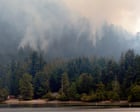
As we experience the height of summer in many parts of the world, a series of environmental events underscores the vital importance of addressing climate change and its impacts on our planet. Stretching from wildfires in North America to record-breaking temperatures in Asia, and further affecting the biodiversity in Australia, each incident provides a profound reminder of the Earth’s interconnected ecosystems.
In North America, the air quality has become a pressing concern as wildfires continue to blaze across Canada and parts of the United States. These fires have led to smoke drifting over vast areas, prompting air quality alerts in fourteen states, from the Great Lakes to the northeastern regions. The impact on visibility was significant enough to cause a ground stop at Boston’s Logan International Airport. Cities like Detroit, New York City, and Chicago have ranked among the top locations worldwide with the poorest air quality. The ongoing situation highlights the need for enhanced fire management systems and strategies to mitigate air pollution.
Turning our attention to Asia, Japan and South Korea are enduring unprecedented heatwaves. Japan recently recorded its highest temperature to date at 41.2°C in Tamba, with numerous local records shattered across the country, including in Kyoto. Similarly, South Korea is experiencing a notably warm summer, with Seoul witnessing 22 consecutive nights with temperatures over 25°C. These temperature extremes, breaking records for multiple consecutive years, emphasize the evolving climate patterns that demand adaptation and resilience from nations, while spurring global efforts to curtail emissions and temperature rise.
In another part of the world, the Great Barrier Reef stands as a stark indicator of ongoing environmental stress. For the first time since the 1980s, the famed reef has suffered its largest annual reduction in live coral in two of its three main areas. A comprehensive report from the Australian Institute of Marine Science attributes this decline to the mass coral bleaching event of early 2024, the most widespread and severe on record. There is concern about the reef’s ability to recover between catastrophic events, indicating the urgent need for conservation initiatives as well as global climate action.
Moreover, in Europe, the Languedoc region in France is grappling with rapidly spreading wildfires. Over a thousand hectares have been scorched, necessitating the deployment of 750 firefighters, supported by aerial resources such as Canadairs and helicopters. This reinforces the propensity for rapid wildfire spread under favorable conditions, leading to the deployment of significant resources to control such outbreaks.
Further north in Finland, an unexpected consequence of the record heatwave has been its impact on reindeer. These arctic animals, well adapted to the cold, find themselves unable to regulate their body temperature amidst the unusual warmth, leading to unfortunate fatalities. This serves as a poignant example of how species are affected differently by climate anomalies, calling attention to the broader implications of temperature fluctuations on wildlife.
The compounded effects of these events serve as a potent reminder of the pervasive influence of climate change across the globe. While challenges are evident, the collective response—through technology, policy advocacy, and community resilience—brings hope. Efforts to improve air quality monitoring, enhance energy efficiency, and fortify natural habitats against climate-induced threats are more critical than ever. As nations collaborate and innovate, our shared goal remains safeguarding the planet for future generations. Through informed action and global solidarity, there lies a promising path towards a sustainable future.
Source: {link}
